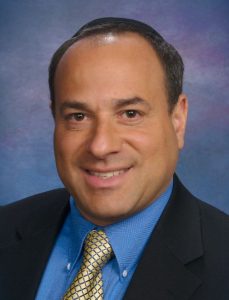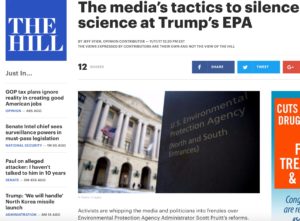28 Nov 2017 Greens Oppose Conflict-Free EPA
Despite all the demands for sound science, green activists are seeing red over EPA Administrator Scott Pruitt’s plans to make the federal environmental bureaucracy more accountable as well as free from unnecessary and unproductive conflicts of interest.
 In a commentary published in The Hill, one of the must-read publications on Capitol Hill, Jeff Stier, director of the National Center’s Risk Analysis Division, reported that activists worried about their ox being gored “are whipping the media and politicians into frenzies” over new Trump appointees and a Pruitt initiative to distance grantees from potential influence over the grant-making process.
In a commentary published in The Hill, one of the must-read publications on Capitol Hill, Jeff Stier, director of the National Center’s Risk Analysis Division, reported that activists worried about their ox being gored “are whipping the media and politicians into frenzies” over new Trump appointees and a Pruitt initiative to distance grantees from potential influence over the grant-making process.
Jeff noted the anti-Pruitt campaign “undermines not only good policy-making but the environment where healthy democracy thrives.”
Pruitt announced the changes to its advisory structure in late October. To “improve the internal management” of the agency and provide “better, more effective government,” advisory committees serving the EPA will no longer be comprised of members getting federal money. Previously, there was the potential for conflicts of interest when those advising the government could have also benefited financially from the policies and programs they recommended. The panels are also now compelled to be more diverse in the backgrounds of those serving, their geographic diversity and have a more frequent rotation of membership.
According to the EPA, members of the EPA’s Scientific Advisory Board, Clean Air Scientific Advisory Committee and Board of Scientific Counselors received at least $77 million in taxpayer funds while serving on those groups.
The process will affect approximately 65 spots among the groups. Pruitt said: “Whatever science comes out of EPA shouldn’t be political science. From this day forward, EPA advisory committee members will be financially independent from the agency.”
 Jeff noted the merit for such reform, and how initial steps by the Trump Administration show this swamp-draining is much less onerous than the green gadflies predicted:
Jeff noted the merit for such reform, and how initial steps by the Trump Administration show this swamp-draining is much less onerous than the green gadflies predicted:
Because the boards influence agency priorities, including millions of dollars in grants, the conflict of simultaneously serving on a board and being a grant recipient is obvious. But rather than applauding the move, those who have been incensed by more tenuous conflicts are seething that Pruitt is cracking down.
The move is “the equivalent of burning books that you don’t like,” according to Elena Craft, a senior scientist at the Environmental Defense Fund.
Reactions like Craft’s are now standard fare from activists and mainstream media alike. But the allegations don’t withstand scrutiny. On November 3, Pruitt reappointed Craft’s fellow fund senior scientist Jennifer McPartland to a coveted seat on the Board of Scientific Advisors. Book-burners would be appalled by the sloppiness…
[A]ctivists’ dogmatic approach to environmental policy, coupled with constant conflict complaints, suggests they deny the notion that there’s ever any validity to dissenting views.
Rather than having to inform the public with complicated science policy arguments, strident groups score points for taking the low-road.
Jeff also noted the campaigns being waged against key Trump appointees, including Michael Dourson as assistant administrator and Nancy Beck as deputy assistant administrator of the EPA’s Office of Chemical Safety and Pollution Prevention. He wrote:
There’s good reason for big-government environmental activists to be threatened by the appointment of scientists like Beck and Dourson, as well as the removal of actually conflicted EPA advisory board members. These leading regulatory scientists with real-world experience are actually effective critics of the EPA’s flawed and even dangerous regulatory over-reach.
While key initiatives are stymied in Congress, the Trump Administration seems to be much more effective these days in helping to transform the bureaucracy. These appointments and administrative changes to reform the EPA are just the sort of things that may define this presidency, and affect government operations for many years to come.



